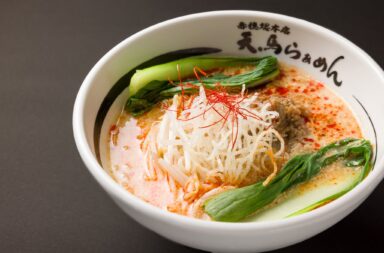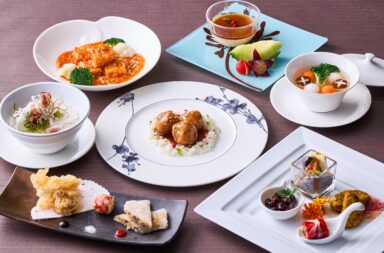This post is also available in: 日本語 Indonesia
How do Muslims Living in Japan Spend Ramadan?
Ramadan started on March 23rd, 2023, and Muslims all around the world are filled with joy and excitement. The fasting period may vary depending on the country. In Japan, we usually fast for 14 to 16 hours, while it typically lasts around 12 hours in Southeast Asian countries.
Today we talk with Muslims living in Japan about their daily routine during Ramadan.

Suhoor
In Japan, the time for suhoor (early morning meal) changes depending on the season. This year, we have suhoor is at around 3:00 AM because the time for imsak (start of fasting) is between 3:30 AM to 4:00 AM (the time may vary slightly depending on the day).
Regarding food, there are slight differences between Japanese Muslims/Muslims born and raised in Japan and Muslims from Southeast Asia.
In Southeast Asia, suhoor is perceived as breakfast, so most eat rice and side dishes as typical breakfast foods which are filling and keep you satisfied for a long time.
On the other hand, Japanese Muslims and Muslims born and raised in Japan tend to choose easily digestible foods such as yogurt, bananas, toast with eggs, because heavy foods in the early morning make them feel heavy in the stomach, and commonly enjoyed with milk, smoothies, or water.
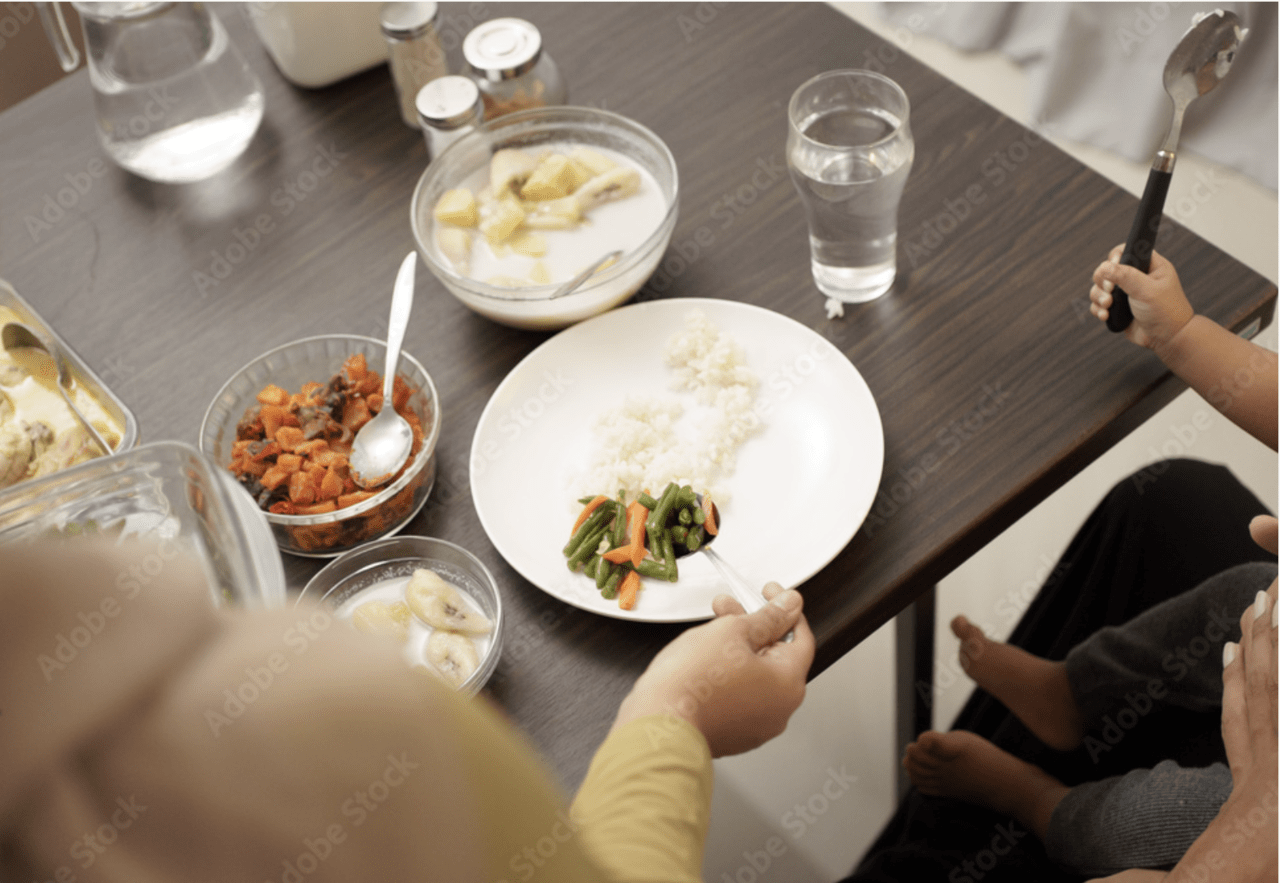
As we cannot drink water throughout the day, many people make sure to drink enough water during suhoor.
After eating, we do morning prayer and some people go back to sleep while others spend time reading or studying the Qur’an until it’s time to go to work or school.
During The Daytime
In Japan, regardless of Ramadan, work and school hours remain the same. We wake up and take the train at the usual time. In the case of working from home, we prepare well before work time starts and work as usual. There are no significant changes other than not eating and drinking during the daytime. We use lunch breaks to take a nap and prepare for the afternoon work.

During fasting, colleagues, bosses, and teachers may be concerned about the possibility of collapse, especially when doing heavy work or on a very humid hot day. However, we are used to fasting and knowing our limits, so we can stop fasting when feeling that we have reached our limit or are feeling unwell. It is important to understand each other between companies/schools and Muslim staff/students.
See Also
What are Muslims in Japan Preparing for Ramadan 2023?
Iftar
In the evening when the time for iftar comes, mostly we enjoy an iftar meal whether at home or at work. Since we fast for several hours, we preferably have easily digestible foods, such as dates and fruits with tea or water. Also, since iftar and prayer time are very close, we do the prayer soon after iftar and then enjoy dinner.
When having iftar at the mosque, foods for iftar are usually served together with dinner, such as biryani rice as shown in the photo below. In that case, we first eat the dates to finish the fasting on that day, do prayer, and then eat the main meal. However, since the mosque is the place where Muslims from various countries gather, there are also those who eat everything before doing the prayer.
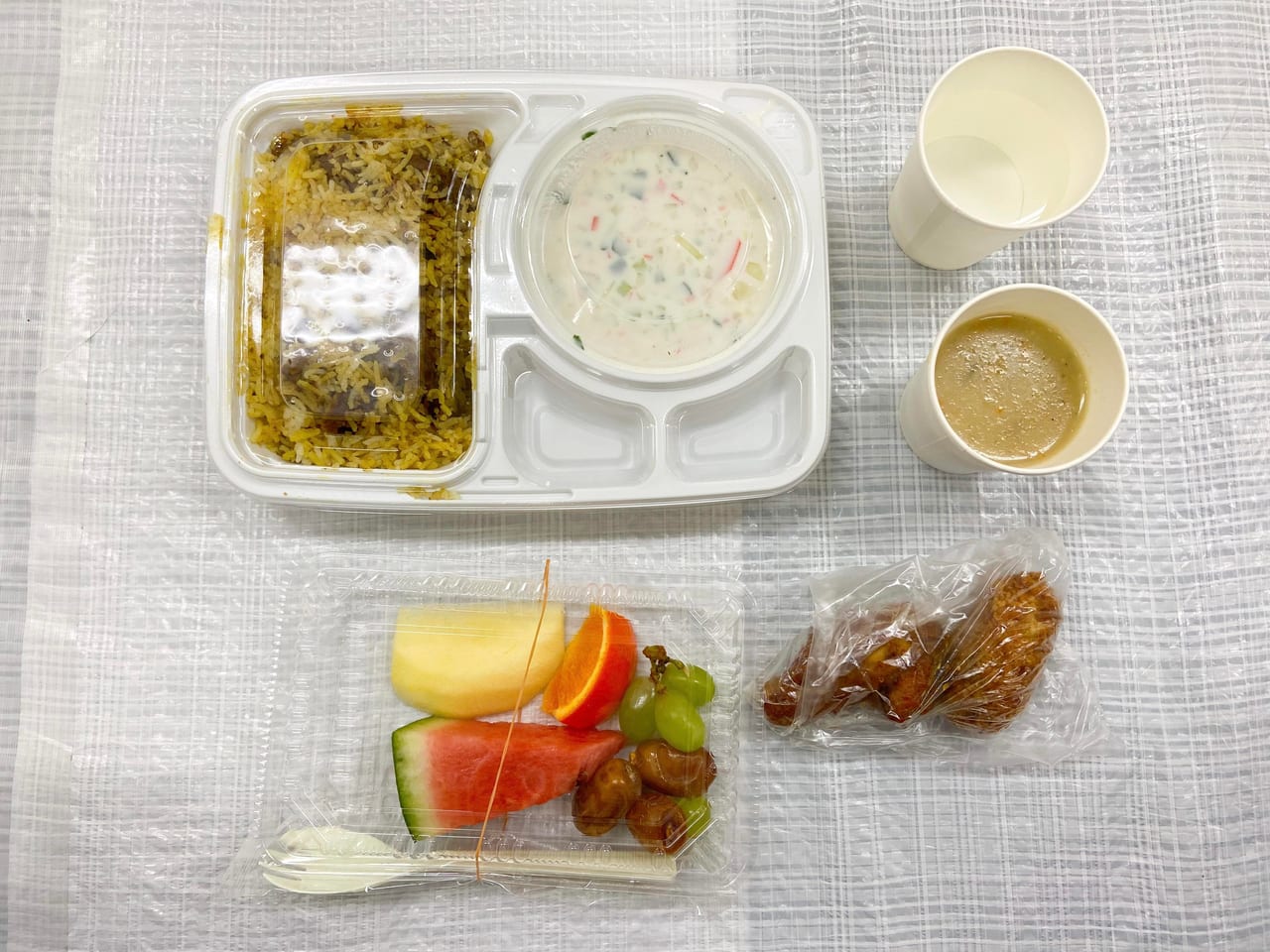
Iftar foods at a mosque
During Ramadan, we used to bring dates along when going out, so that it allows us to break the fast wherever we are.
See Also
Celebrate Iftar in Japanese Style with These 3 Japanese Traditional Foods and Drinks
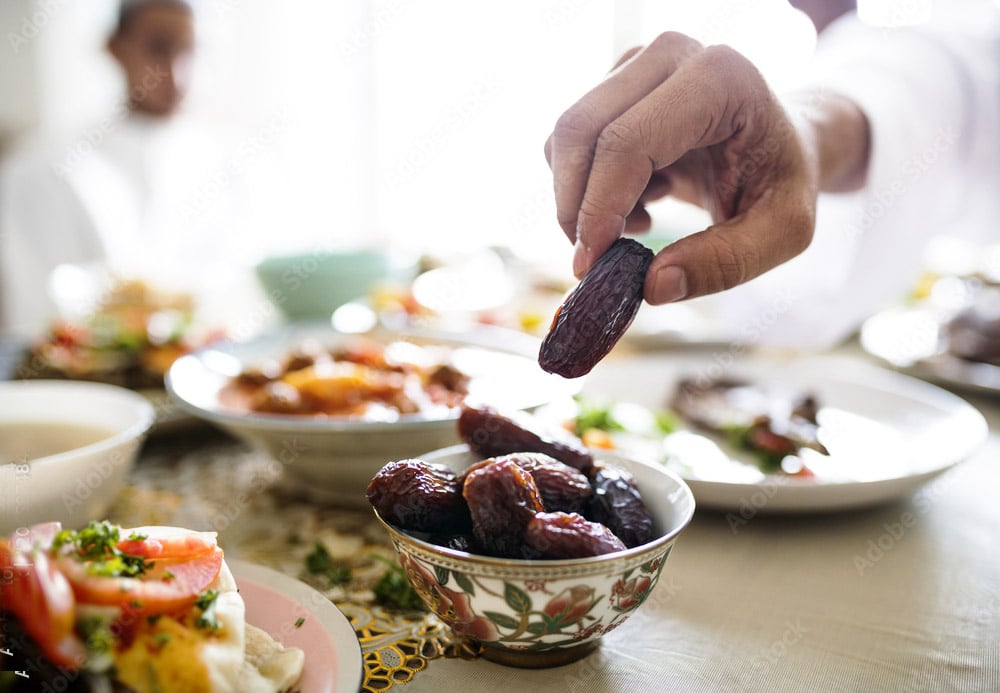
Eat dates for iftar
In recent years, dates have become easier to get in Japan. A few years ago, we had to bring them from overseas or could only purchase them at Halal shops, but now we can buy them at Amazon and Kaldi Coffee Farm, which has branches throughout Japan.
Dinner
For dinner, we have meals just like usually we have for dinner, but we carefully watch the amount we eat. It is because we need to watch our blood sugar level so that we don’t get sleepy during the next prayer, in addition to that because we eat something on the iftar.
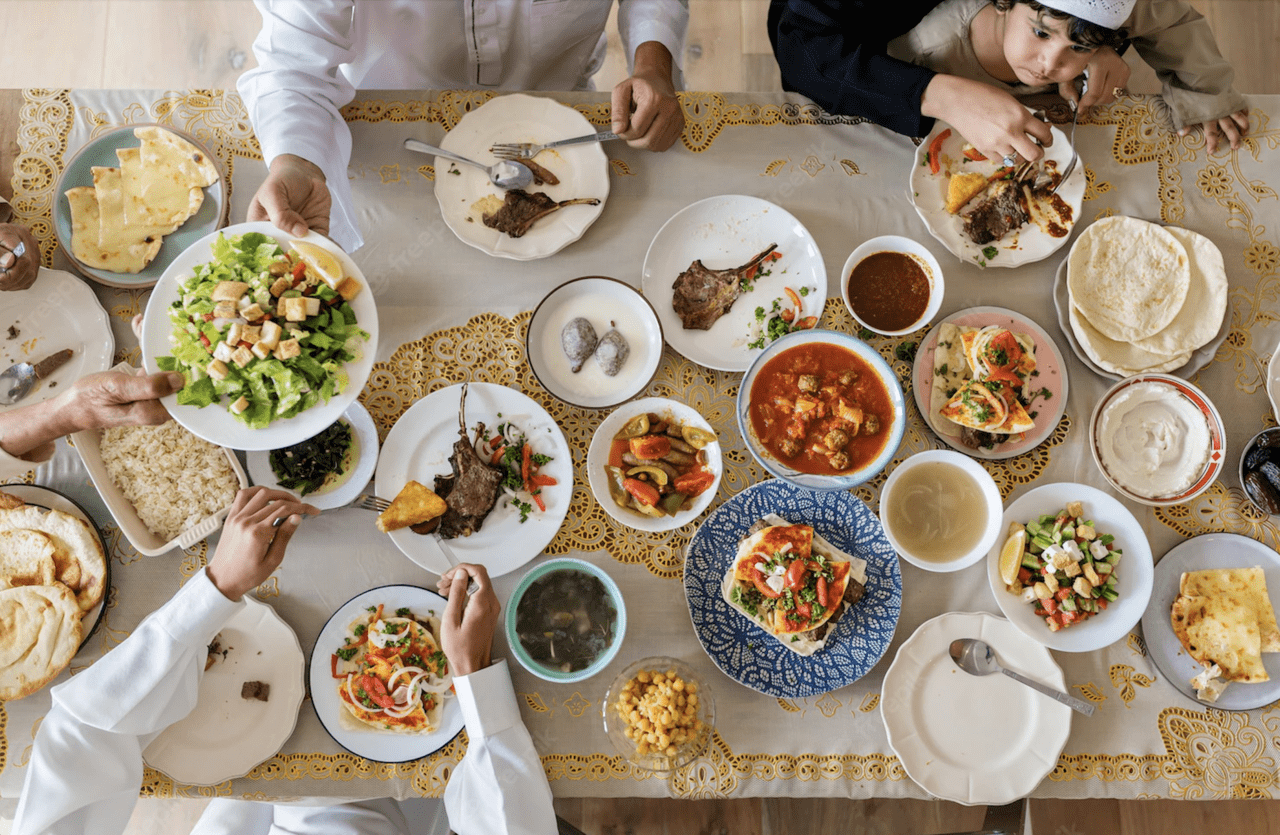
Ramadan increases the feeling of gratitude for “not having to worry about food” and “being able to eat delicious things”.
At Night
After dinner, we do the Tarawih prayer and recite the Al-Qur’an. It’s the same with Muslims worldwide, we do more prayers, Al-Quran recitations, etc than usual during the holy month of Ramadan.
Tarawih and Al-Quran recitation is mainly done at home alone or with family. In Muslim-majority countries, it is common to do Tarawih prayer and Al-Quran recitation together at the mosque. However, in Japan, mosques are sparse and far away, in addition to that work or school on the next day, so we can only go on weekends or when we have time.
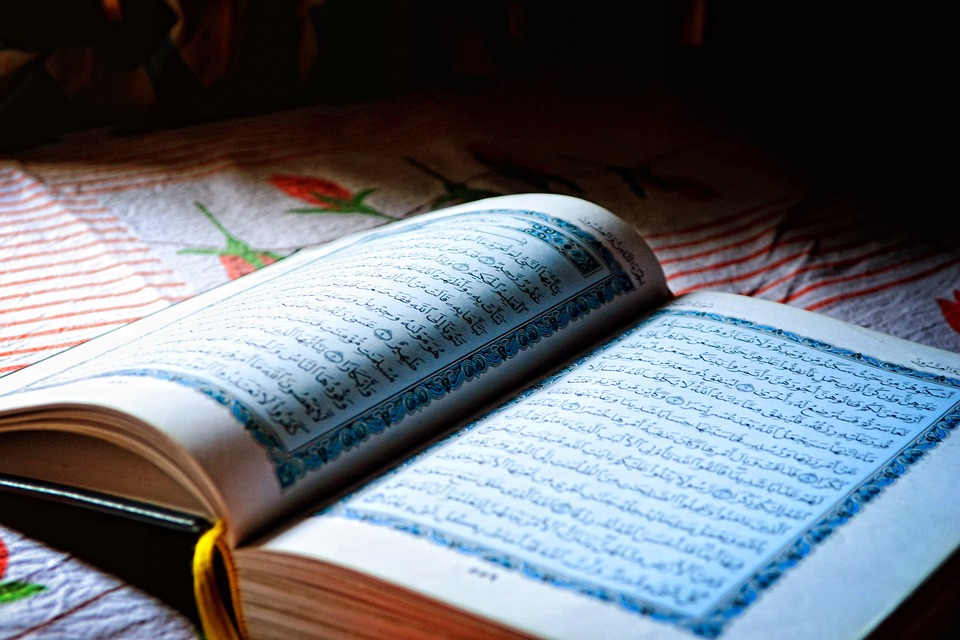
Since there are more nighttime prayers, the bedtime also becomes later. We sleep around 11-12 at night, wake up early in the morning for suhoor, and then start activities on the day.
The Importance of Fasting
Besides obligations in Islam, Ramadan fasting has some purposes such as promoting physical, mental, and social well-being. Fasting is believed to enhance self-control/self-discipline and contribute to personal development. Additionally, through fasting, we are encouraged to empathize with and provide charitable acts for those who need them.
Fasting during Ramadan is an important practice to deepen our faith and to consider our health more when choosing what to eat.
See Also
What Is It Like To Celebrate Ramadan in Japan?
Ramadan 2022 Activities In Japan
The Japanese surrounding us are sometimes misunderstanding that we, Muslims, abstaining eating or drinking for the entire month. Rather, we only abstain from eating and drinking during the daytime and are allowed to eat and drink during the night. That’s why Muslims in Japan communicate about Ramadan and fasting to their Japanese fellows as one of the preparations we do in welcoming Ramadan.
During fasting, we may face situations with a decrease in concentration during work or classes or fatigue during physical labor. In that case, it is important to communicate with the people surrounding us to get the support we need.
